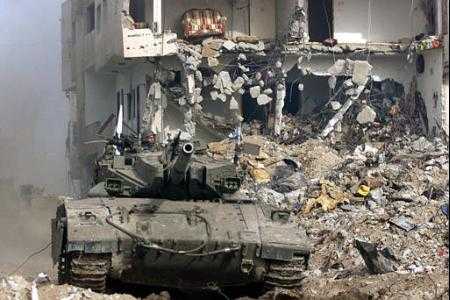Joint letter: Grave concern regarding Israeli calls to vacate northern Gaza Strip
14 July 2014
Mr. Moshe Ya'alon, Minister of Defense
Mr. Danny Efroni, Military Advocate General
Mr. Yehuda Weinstein, Attorney General
Dear Sirs,
Re: Calling upon residents to vacate their homes in northern Gaza Strip raises concern of extensive mortal harm to civilians and damage to civilian property
On the night between Saturday, 12 July 2014, and Sunday, 13 July 2014, the Israeli military began dispersing leaflets in the northern Gaza Strip, particularly in the area of Beit Lahiya, which announced its plan to carry out air strikes on an area marked in an attached map. Residents were told to evacuate the area and make their way on foot towards Jabalya refugee camp by noon yesterday (13 July). The leaflet noted that the planned action was to be short.
Based on previous military operations in the Gaza Strip, and on military actions that followed similar instructions for evacuation, we – the undersigned organizations – hereby voice grave concern that the military's planned actions may cause extensive, mortal harm to civilians and much property damage.
The military is obliged to uphold the provisions of the First Protocol Additional to the Geneva Conventions, which are considered customary law, and especially articles 51 to 58. Primarily, we wish to underscore the following points:
- Distributing leaflets and giving prior warning in a particular area do not render every military action there lawful under international humanitarian law, especially where civilians are concerned. At present, with the military bombing many other areas in the Gaza Strip and with residents essentially confined to the Gaza Strip with no available option of fleeing it, there appears to be no way to completely evacuate the targeted area. Given these circumstances, one is hard put to consider the dispersal of leaflets "effective" warning.
- In view of the above, dispersal of leaflets does not grant the military permission to consider the area as if it were so-called “sterile”, assume that no civilians were left in the area and then proceed to attack civilian sites. The military must not assume that all residents have indeed left their homes, an assumption that presumably underpinned many of the military’s actions in Operation Cast Lead and caused the deaths of many civilians entirely uninvolved in combat.
- Air strikes of inhabited areas could cause massive damage to civilian property and infrastructure; and there is concern that residents may have nowhere to return to. International humanitarian law explicitly prohibits attacks against civilian property or civilian infrastructure, and regarding the entire area as a military target is forbidden. Causing extensive damage to civilian property for reasons presented as "forward-looking", as was done towards the end of Operation Cast Lead, is also entirely prohibited.
Under international humanitarian law, the argument that combatants from Hamas or other organizations are operating from within the civilian population does not, in itself, render civilians and civilian sites military objectives that may be attacked. Israel cannot absolve itself of responsibility for the grave harm to civilians that we have witnessed since the beginning of Operation Protective Edge (and in the past) by claiming that Hamas and other organizations are operating from within the civilian population or are using residents as human shields.
Israeli bears sole responsibility for its strikes on the Gaza Strip, even if Palestinian organizations are operating unlawfully. Deliberate attacks against civilians and civilian property are a grave breach of international humanitarian law.
Sincerely,
Sharon Abraham-Weiss, Executive Director of the Association for Civil Rights in Israel
Hagai El-Ad, Executive Director of B’Tselem – The Israeli Information Center for Human Rights in the Occupied Territories
Hassan Jabareen, Executive Director of Adalah – The Legal Center for Arab Minority Rights in Israel
Yonatan Gher, Executive Director of Amnesty International – Israel
Eitan Diamond, Executive Director of Gisha – Legal Center for Freedom of Movement
Ran Cohen, Executive Director of Physicians for Human Rights – Israel
Dr. Ishai Menuchin, Executive Director of the Public Committee against Torture in Israel
Neta Patrick, Executive Director of Yesh Din – Volunteers for Human Rights
Dalia Kirstein, Executive Director of HaMoked: Center for the Defence of the Individual
Photo by Eyad Al Baba
















